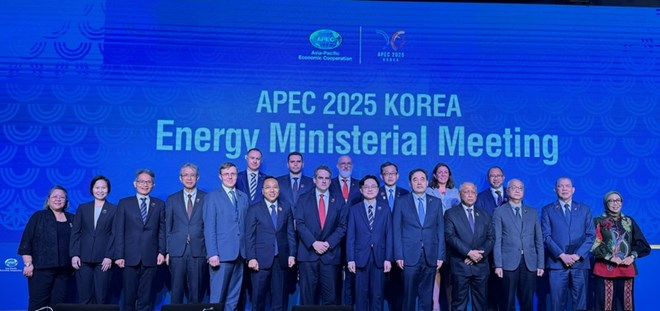
At meeting, Deputy Minister Nguyen Hoang Long emphasized that, to ensure sufficient electricity supply for Vietnam’s high economic growth targets, it is essential to assess development potential of different types of power sources and adjust generation mix, particularly for period up to 2030. (Photo: Ministry of Industry and Trade).
EMM 15 was held under the theme “Connect – Innovate – Prosper”, with priorities focused on enhancing cooperation and applying technological innovation to promote sustainable development. This thereby contributes to continued progress in the energy transition and to the move toward a low-carbon APEC region.
At the meeting, Deputy Minister Nguyen Hoang Long noted that to ensure sufficient electricity supply in the coming years - supporting Vietnam’s GDP growth target of over 8% in 2025 and double-digit growth during 2026 – 2030 - it is necessary to review and evaluate the development potential of all types of generation, and to adjust the generation mix, giving priority to power projects with short implementation timelines to promptly meet electricity demand.
Currently, Vietnam’s power system ranks first in Southeast Asia and is among the top 20 largest power systems worldwide in terms of installed capacity. However, it is increasingly facing new operational challenges due to the high penetration of renewable energy sources, particularly wind and solar.
Therefore, Vietnam attaches importance to and is ready to cooperate with APEC members in the energy sector, improving the reliability of power supply to the power system; at the same time, it wishes to receive support in finance, technology, governance, infrastructure, human resource training, etc., to promote the completion of its targets more strongly and effectively.
According to the agenda, the meeting focused on three key regional energy issues:
- Expanding power supply to ensure stability: Ministers exchanged views on policies and technological solutions to diversify energy sources and enhance the flexibility, resilience, and stability of power systems. They shared experiences in establishing investment-supportive frameworks and efficient market operations, while discussing the role of public-private partnerships in mobilizing resources and fostering innovation to ensure a sustainable, safe, and reliable electricity supply from a diverse energy mix.
- Strengthening grid security and reliability: Ministers discussed major challenges faced by APEC economies, including rapidly rising electricity demand, limited transmission infrastructure, increasing diversity of renewable energy sources, and growing complexity in system management. Expanding transmission capacity, modernizing smart grids, developing energy storage systems, and promoting cross-border interconnections—together with strengthened regional cooperation—were identified as key to enhancing the flexibility, resilience, and reliability of power systems.
- Artificial Intelligence (AI) as a Driver of Innovation in the Energy Sector: Ministers highlighted AI’s potential to improve energy management efficiency, enhance demand forecasting, optimize system operations, and strengthen the security and reliability of power systems. Alongside its opportunities, the adoption of AI also poses challenges, including increased electricity demand from data centers and the need for legal frameworks, technical capacity, and transparency. Therefore, fostering regional cooperation, sharing experiences, developing supportive policies, and ensuring safe, responsible, and reliable AI deployment were emphasized as crucial to accelerating AI-driven energy innovation, contributing to the development of a sustainable, secure, modern, and innovative APEC energy system.
With respect to AI development, promoting international cooperation in AI is one of Vietnam’s national strategic directions toward 2030. Vietnam welcomes initiatives that promote AI applications in the energy sector at both regional and economic levels, including the APEC Business Advisory Council (ABAC) recommendations on the urgent demand for data centers. Vietnam also stands ready to cooperate with APEC members on AI infrastructure development, technology transfer, and high-quality human resource training, thereby contributing to the development of a sustainable, secure, and innovative energy system.
Translator: Thanh Hải
Share